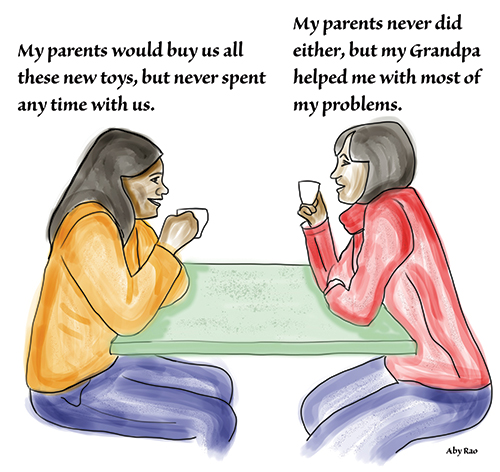
Most of us have some experience with living in a family of multiple generations under one roof even though the world does not seem to be going that way for some time now. Today the tendency is to have just our own immediate unitized family and that is it. Certainly there are benefits to that arrangement but there are numerous disadvantages, too. It seems that the western world has most certainly adopted that kind of thinking where as the eastern world is still struggling with the idea. We have organized society today so the generations have little contact in their daily lives as well as in education, workplace and in housing. That is regrettable.
One of the biggest benefits is the wealth of information that can be transferred to the next generation through the personal hands-on experiences, stories, tales and anecdotes and other ways that a senior generation can impart to the younger one. I am thinking especially of financial matters. It can be argued that the old ways of doing things are not applicable anymore and they cannot be applied and need not be taught to the young. There could be some truth to that but we only have to keep in mind that the basic process does not change even though the way of teaching or imparting that knowledge could be different and made easier for the young brain to comprehend and retain. Look at it this way: 2 x 3 + 4 has equaled 10 for ages and has not changed, but the way teachers impart that concept to the students could be different.
An example of this in the financial world could be if you wish to instill the thought of saving money for the future, then that process has not changed. Neither has the fact that the saving is for the future (retirement) and when you save and invest you would earn some interest or growth on that money. But how to go about doing that could be totally different today than it was even 25 years ago. Unfortunately, that process starts anew for every generation and the only way the new generation is going to learn is via their parents, if they are lucky, or via the hard knocks of self-taught experiences.
In my opinion, most of the younger generation is looking for some guidance from the older generations, some hand-holding and avoiding the pitfalls that the elders have suffered through. We make our best efforts to keep our family comfortable; now let us help them create the financial confidence so that they can accomplish the same for themselves and for their children. They need to be taught certain skills for that to happen and, like I mentioned above, older folks are not that much around the children to do that successfully. Here is where we could start.
We give so much material stuff to our children at a very early age that the value of such stuff (toys, clothes, gadgets, pricey dining, vacations, and camps) is compromised heavily. Children just don’t have any value for such things anymore. Toys, as new gifts, will be played for five minutes and then pushed in the corner never to be seen again; this is just one example. Instead, perhaps telling the child that instead of ten toys, cash for the five toys will go in their bank account and they should observe how it is growing every year. They also need to know that this money will be used for their college expenses. I always struggle with the thought of how such habits can be formed in a young age and how we can help them enhance those in the future.

To enhance the value of money further, let the children be allowed to earn some small money on their own at an appropriate age. Extra chores in the home, not the ones they must be doing anyway, can earn money. Babysitting at the right age and with the right aptitude, dog walking, cat sitting, plants care-taker, lawn mowing with the right physique, some literary work at the school newspaper or library are all good examples of getting them to understand the value of money. I have seen juveniles showing talent and starting businesses like coding, computer and cell phone repair, minor car maintenance, doing artwork, etc.
At an early age they can be introduced to picking stocks, initially just as an exercise with presumed money to gain experience but later with limited amount of real money. This is a good step because they quickly come to appreciate the facts that hasty actions have bad consequences and that long-term thinking is essential. The biggest benefit might be to learn the process of deciding which companies to own for the future.
Everything mentioned above not only gives some entrepreneurial experience to the young generation but also firmly establishes the fact that we are the masters of our own actions and thoughts. We can win if done right and we can lose if done hastily. A little stumble here, a little roadblock there under the tutelage of an experienced elder is never bad; in fact, it only adds to the character. Knowing that we can’t win every thing every time does not have to come only from learning President Lincoln’s biography, it can be experienced first hand under some seasoned supervision.
Financial bridges can be built across generations if only given a chance. The way this fast-paced western world is moving is scary and if the older experiences are discarded as ancient and useless then it will be even scarier. As mentioned before, the process does not change; it’s just that different tools get used. Older generations can and should certainly help plant these educational trees knowing well that they will never sit under the shade of those trees. But does it matter?
———
Mo Vidwans is an independent, board-certified financial planner. For details visit www.vidwansfinancial.com, call +1 (984) 888-0355 or write to mpvidwans@yahoo.com.



